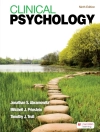Provide your students with engaging material on social class and classism
The impact of social class and classism on mental health functioning crosses racial, ethnic, and social lines and significantly contributes to our overall well-being. Any attempt to understand individuals must include an understanding of how economic issues and class have contributed to their difficulties. In
Social Class and Classism in the Helping Professions, author William Ming Liu presents theory and research on the impact of classism and social class on mental health. He provides an original framework—the Social Class Worldview Model—for exploring each person′s individual and subjective life experiences. These experiences form a perspective that is unique to the individual. The author then helps the reader integrate this realization into the study of poverty, economic inequality, wealth, and the often overlooked implications of greed, materialism, and consumerism for a more complete understanding of social class and classism.
Intended Audience
This text is intended as a supplement for graduate and advanced undergraduate courses that address psychological and counseling theories, multicultural counseling, and research in the helping professions. These courses may be found in departments of counseling, rehabilitation, psychology, education, nursing, and social work.
Table des matières
Preface
Acknowledgments
Chapter 1. Introduction
Definition and Focus
The Importance of Social Class in the Helping Professions
Research
The Helping Professions′ Poor Understanding of Social Class and Classism
Sociology′s Impact on the Helping Professions
Social Class, Socioeconomic Status, Social Status, and Classism
Social Class and Classism Multicultural Competencies
Conclusion and Summary
Chapter 2. Social Class, Classism, and Mental and Physical Health
The Context of Social Class and Classism
The Social Class Health Gradient
Social Class and Mental Health
Implications for Practice
Conclusions and Summary
Chapter 3. Problems in Social Class Measurement and Research
Problems With Current Methods for Understanding Social Class
Categorizing Social Class
How Is Categorizing Accomplished?
Moving Toward Subjectivity of Social Class and Classism
Implications for Practice
Conclusion
Chapter 4. The Social Class Worldview Model
The Context of Economic Cultures
Social Class and Classism Consciousness
Implications for Practice
Conclusion
Chapter 5. Social Class and Psychotherapy, Counseling, and Career-Related Issues
Counseling, Psychotherapy, and Helping Professionals
Social Class and Classism to Inform Our Work With Clients
Empirically Validated and Supported Treatments and Common Factors
Understanding Our Own Biases and Social Class Experiences
Career Counseling
Using Social Class-Based Interventions in Counseling
Implications for Practice
Conclusion
Chapter 6. The Impact of Social Class and Classism on Healthy Psychological Development
Social Class and Classism and Psychological Development
Quality of Child Care
Sleep Habits
Parent and Child Relationships
Impact of Media and Television
Social Class and Classism Traumas
Into Adulthood
Implications for Practice
Conclusion
Chapter 7. Greed, Materialism, and Affluence and Mental Health: The Rich Are Not Immune
Greed, Materialism, and Affluence
Consumption and Being Healthy
Materialism and Consumerism
Other Forms of Commodification and Consumerism
Consumerism
Affluence and Mental Health
Implications for Practice
Conclusion
Chapter 8. Classism, Inequalities, and Poverty
How People Make Meaning of Poverty and Inequality
Racism
Economic Resources, Economic Privilege, Economic Entitlement
The Psychology of Privilege and Entitlement
Classisms
White Trashism
Implications for Practice
Conclusion
Chapter 9. Integrating Social Class and Classism Into Training, Education, and Supervision
Training and Education
Upward Mobility Bias
Becoming Social Class and Classism Competent
Using the Social Class Worldview Model (SCWM-R) as a Training Tool
Training Experiences and Supervision
Privilege and Power
Conclusion
Chapter 10. Social Class, Classism, Advocacy, and Social Justice
Definitions and Contexts of Social Justice, Advocacy, and Empowerment Work
Definitions
Social Justice and Social Class and Classism
Advocacy
Empowerment
Conclusion
References
Index
About the Author
A propos de l’auteur
William Ming Liu
Professor
N328 Lindquist Center
Psychological and Quantitative Foundations
Iowa City, IA 52242
Affiliations within the College
Department of Psychological and Quantitative Foundations
Counseling Psychology Program
Academic History
Ph.D. in Counseling Psychology, University of Maryland, 2000
Expertise
Multiculturalism, Social Class, Men and Masculinity
Research Interests
Social Class, Men and Masculinity, Multicultural Competencies
Professional Experience
Program Coordinator, Counseling Psychology Program, University of Iowa
Professional Service
Committee Assignment, Asian American Psychological Association, 2009-current.
Committee Assignment, Division 17, Society of Counseling Psychology, 2009-current.
Journal Editorial Board, Men and Masculinities, 2008-current.
Journal Editorial Board, Psychology of Men and Masculinity, 2007-current.
Committee Assignment, American Psychological Association, 2006-current.
Committee Assignment, Division 51 Member at Large, elected position, 2006-current.
Manuscript Reviewer, American Journal of Orthopsychiatry, 2006-current.
Manuscript Reviewer, Journal of Career Development, 2006-current.
Manuscript Reviewer, Journal of Counseling Psychology, 2006-current.
Committee Assignment, Diversity Advisory Board, Belin Blank Center, 2005-current.
Manuscript Reviewer, Professional Psychology: Research and Practice, 2005-current.
Manuscript Reviewer, Sex Roles Journal, 2005-current.
Editorship, Editorial Board Member, Cultural Diversity and Ethnic Minority Psychology, 2000-current.
Committee Assignment, Dean′s Search Committee, 2010-2011.
Editorship, American Psychologist, Ad hoc reviewer, 2004-2007.
Committee Assignment, Graduate College, 2007.
Committee Assignment, National Multicultural Conference and Summit (NMCS) 2007, American Psychological Association, 2005-2007.
Committee Assignment, Office of the Vice President for Research, 2007.
Committee Assignment, Office of Student Services, 2006.
Committee Assignment, College of Education, 2006.
Committee Assignment, Division 17, Program Committee Member, 2003-2006.
Committee Assignment, Oberman Center, 2006.
Committee Assignment, Iowa Testing and Measurement Foundation, 2006.
Committee Assignment, Vice President for Research, 2006.
Committee Assignment, Advisory Committee on Diversity, Belin and Blank International Center for Gifted Education and Talent Development, 2005.
Editorship, The Counseling Psychologist, Editorial Board, 2005.
Committee Assignment, Diversity Review Task Force, 2004-2005.
Editorship, Psychology of Men and Masculinity, 2003-2005.
Editorship, Clinicians Research Digest, 2003-2005.
Committee Assignment, Division 17, Hospitality Suite Committee Member, 2003-2005.
Committee Assignment, Division 45, Society of the Psychological Study of Ethnic Minority Issues, APA, 2001-2005.
Committee Assignment, Search Committee Member, University Counseling Service, 2004.
Professional Board, Treatment Improvement Protocol (TIP) for the Knowledge Application Program (KAP), Substance Abuse and Mental Health Administration (SAMHSA) (2003), 2003-2004.
Committee Assignment, School Psychology Search Committee, 2002.
Committee Assignment, Post-Doctoral Search, 2002.
Committee Assignment, Multicultural Education Certificate Program, 2002.
Committee Assignment, Post-Doctoral Search Committee, 2001.
Editorship, Ad hoc manuscript reviewer, Journal of College Student Development, ‘On Campus Section.’, 1995-1997.
Professional Activities and Membership
American Counseling Association
American Psychological Association
Asian American Psychological Association
Division 17, Counseling Psychology of APA
Division 45 Ethnic Minority Issues in Psychology of APA
Division 51, Men and Masculinity of APA
Licensure and Certifications
State of Iowa, Psychology License, Board of Psychology, State of Iowa
Awards and Professional Recognition
Lodge Project Advisory Board,
Board of Directors
Award for Emerging Leadership
Dean′s Scholar Award
Emerging Young Professional
Collegiate Teaching Award
Public Interest Directorate for the American Psychological












